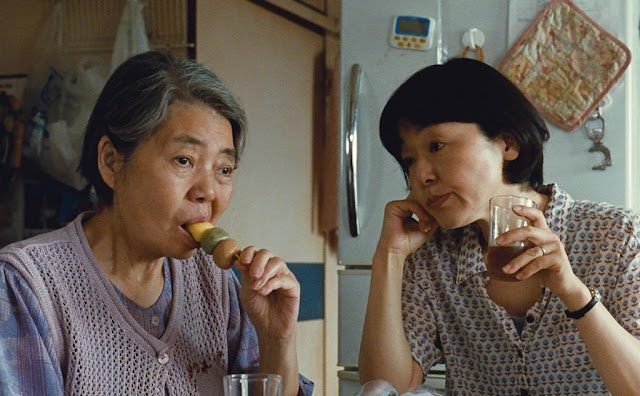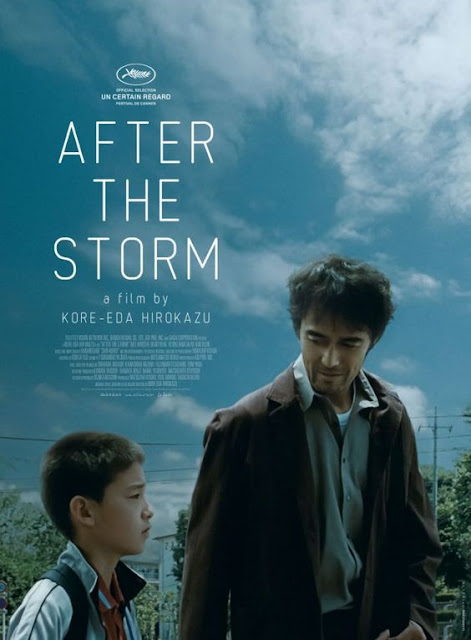We often seek for the extraordinary in cinema that the
visuals of ordinary may turn to be quite insipid. Many hate to see movies
reflecting the mundanity of life. But, we all don’t watch films just as a means
for escape; we watch graceful cinematic works with the power to change our
views (in little ways) on the quotidian existence. Japanese writer/director
Hirokazu Kore-eda is one of the best contemporary film-makers to turn the
ordinary to something very beautiful and emotionally arresting. His movies
always leave an aftertaste; the more we contemplate, the more we understand the
deeper sense of life. He has definitely altered
my perspective of the uneventful everyday life. Like the old Japanese masters
Ozu or Naruse (although their themes & film-form are different), he subtly
observes the changing dynamics of familial life.
Kore-eda’s instantly endearing drama Still Walking (2008) is
one of the best works of his career. It was his most personal film to date.
Still Walking offers an achingly humanistic portrait of Yokoyamas, following
the ebb and flow of their life in 24 hours of a family gathering. Kore-eda
stated that he wrote the script as a tribute to his late mother. Adult males’
regret of failing of live up to his parents’ expectations is one of recurrent
themes in Kore-eda’s film. It was strongly represented with a personal touch
through the son character (played by Hiroshi Abe -- an alter ego for the director).
At one point in the narrative, unable to fulfill his parents’ desires while
they were living, Abe’s character says, “It’s always like that. I’m always a
little late”. In an interview to filmmaker magazine, Mr. Kore-eda confides that
during the shooting of Nobody Knows (2004) his mother was diagnosed with breast
cancer. He says he had the chance to be with her only when she was hospitalized
in the later stages. The personal regret and the conversations he had within
himself led to the making of Still Walking, one of the best family dramas ever
made.
 |
| A still from the film's opening scene. Kore-eda showcases the mother-daughter bond and through their conversation playfully introduces our central character Ryota |
Kore-eda’s latest film After the Storm also has few personal
elements. The mother and son pair of Still Walking – Hiroshi Abe and Kirin Kiki
– plays similar roles, confirming a thematic link between these two films. After
the Storm is also about a middle-aged son, who bears the shame of letting down
his parents. However, the Hiroshi Abe’s son character in this film is a more of
a desperate, phony guy, unlike the character he played in Still Walking. Abe plays
Ryota, a prize winning novelist who is finding it hard to live up to the
success of his first novel. The novel’s title – The Empty Table – seems to
indicate his existence after writing that novel. Ryota works part-time for
detective agency, snooping on adulterous couples and doing some shady deals. He
feeds the little money he earns to his gambling addiction. He is divorced and
two months behind to pay for child support. Ryota’s hard-working ex-wife Kyoko
(Yoko Maki) has arrived at a decision that their 11 year old son Shingo (Toyota
Yoshizawa) would fare better without seeing his father. Kyoko has also started
dating a surefooted office worker. Ryota knows this and follows them around
with his young colleague (Ikematsu).
Ryota despised his father when he was alive. The father also
had a gambling addiction and gave a hard time to his wife (Kirin Kiki) – the
wise mother. The mother lives in a confined public housing complex (Kore-eda once
lived in this particular housing complex) and Ryota rarely visits her, except
when he is desperate enough to sponge off some money from her. Ryota’s
levelheaded sister knows her brother’s schemes very well, although she also
seeks the mother’s help now and then. Ryota decides to make one last effort to
be a good father and definitely vies for Shingo’s love & respect. TV and
radio stations announce the arrival of 24th tornado of the year. A
storm may help the broken family to stick together. Ryota takes Shingo to have
nice outing. He buys him new shoes and takes him to pay a visit to his warm-hearted
mother (Shingo adores his grandmother that he has written an essay about her
for a school project). And, as the storm approaches, Kyoko also happens to make
it to the apartment complex. As always simple things happen & the characters
make simple observations. Nevertheless, similar to all of Kore-eda’s works,
these simple things come together to offer something paradoxically complex or touchingly
lifelike.
Director Kore-eda is so brilliant and nuanced in drawing us
to the characters’ domestic space. Unlike the spacious family house in Still
Walking, the housing complex in After the Storm is so compact. Characters have
to bow down or move forward or sideways to share the space. A little moving of the tangerine plant breaks
the glass in the door; a character reflexively moves as the fridge door is
opened; Ryota’s mother to briefly escape from the heat of constrained space
opens the fridge to let in some coolness. These little movements or gestures
may seem to be nothing. But, I felt such small things take us closer to the
space occupied by the humane characters. Kore-eda subtly instills a sense of grounded
nature or genuine, warm humor through the observation of domestic spaces. The
underlying misery of the housing complex is suggested by old people living
alone or dying out; Kirin Kiki’s mother character, in fact, serves as a perfect
counter to this misery. She is trapped inside the domestic space, yet her
traditional cooking methods and poignant love for family members seems to be
exact opposite of Ryota’s self-destructive conduct.
One of Kore-eda’s fascinating qualities is perceiving
humans with their own set of imperfections. While most film-makers take few
imperfections and blow them out to dramatic proportions, Kore-eda humanizes the
imperfections in a way that we somehow relate or even see ourselves in the characterizations.
When Ryota laments, “It is hard to grow to be a man you wanted to be”, we don’t
just pity him; we reflect on it and take it as the hardest truth. Kore-eda’s
characters derive emotional catharsis by confronting the hard truths of
everyday life. By spending a couple of hours with them, we too get a
least-sentimental, yet a highly cathartic movie experience. The reason for such
a profound experience lies in the manner Kore-eda develops each character,
giving them the space to organically develop a point-of-view. Except for the
wealthy boyfriend of Kyoko, every little character was beautifully realized
with their own perspective on life. They all seem to harp on the two vital
themes in the film: nature or nurture question and life’s inevitable
dissatisfaction and defeats. Of course, there are no neatly-packaged
resolutions; there’s only sad acceptance. But through the acceptance of
inevitable disappointments, Kore-eda also infuses a solemn ‘life goes on’
tone.
Ryota’s old mother wonders “Why men can’t ever love the
present?” It’s a very profound question contemplating our (men’s) obsession
with the idea of ourselves, legacy, etc. It’s also a very Japanese question,
brooding on the nation’s heavy concern for lineage. The film’s English title
plus the image of shiny, blue sky (or the rise of new dawn) after the night of
storm may seem to be a showy metaphor for the get-together of broken family.
However, Kore-eda films are anything but showy. The bright morning after the
storm doesn’t say that everything is resolved; it confides how the members of
family have come to accept their new situation. Towards the end, when the
typhoon blows Shingo’s lottery tickets, the family of three searches for the
damp lottery tickets. They come together and find some, yet few tickets go
missing. Similarly, Ryota, Kyoko and Shingo may now respect and love each
other, but something’s missing (like a small piece of a jigsaw puzzle) to stop
them from going back as a family unit. Eventually, we don’t attain sadness from
Ryota’s predicament. We only hope -- whatever good and bad traits he derived
from his father -- that he finely makes it through the rest of life.
As usual, Kore-eda derives the best, low-key performances
from his actors. Veteran actress Kirin Kiki’s wisecracking comments, nervous
laughs, and self-aware nature in reprising the elderly mother role evokes the
memory of our good-natured grandmothers. Look at her teary-eyed expression when
Shingo says that if he wins money from the lottery tickets, grandmother could
live in the same house as him; or when she joyously runs to prepare the room
for the family’s night stay. Kiki’s emotions are so genuine that (despite lot
of social or cultural differences), I could see my late grandmother in her
character. The conversation Kiki has with Abe’s son character during the storm
couldn’t be just locked under a superlative adjective; it’s beyond that. The
nuanced performances of all these actors depict how simple truths could be so
cleansing & deep than an escalated dramatic payout.
After the Storm (117 minutes) may not be the best work of Kore-eda till date, but like a great artist, he marvelously rehashes the familiar elements to offer something refreshing and new.
After the Storm (117 minutes) may not be the best work of Kore-eda till date, but like a great artist, he marvelously rehashes the familiar elements to offer something refreshing and new.
After the Storm (2016) Trailer
Readers, please feel free to share your opinion by leaving your comments. As always your valuable thoughts are highly appreciated!
People who liked this also liked...



0 comments:
Post a Comment
Thanks for sharing for valuable opinion. We would be delighted to have you back.